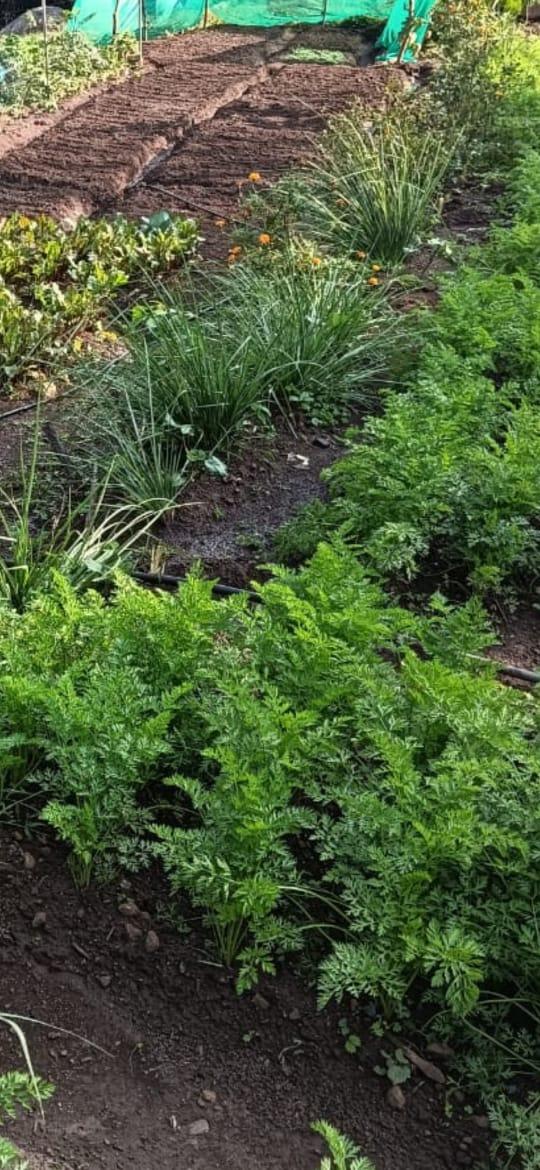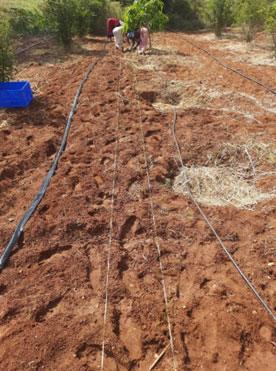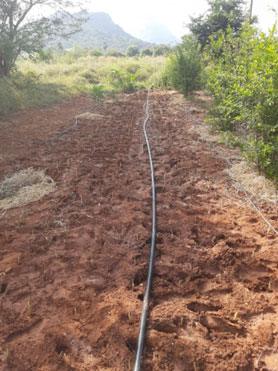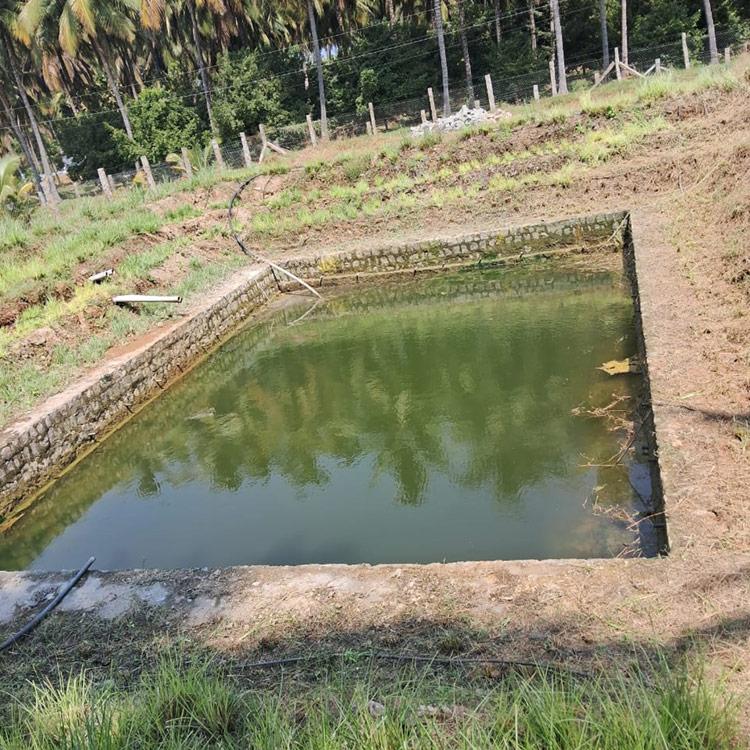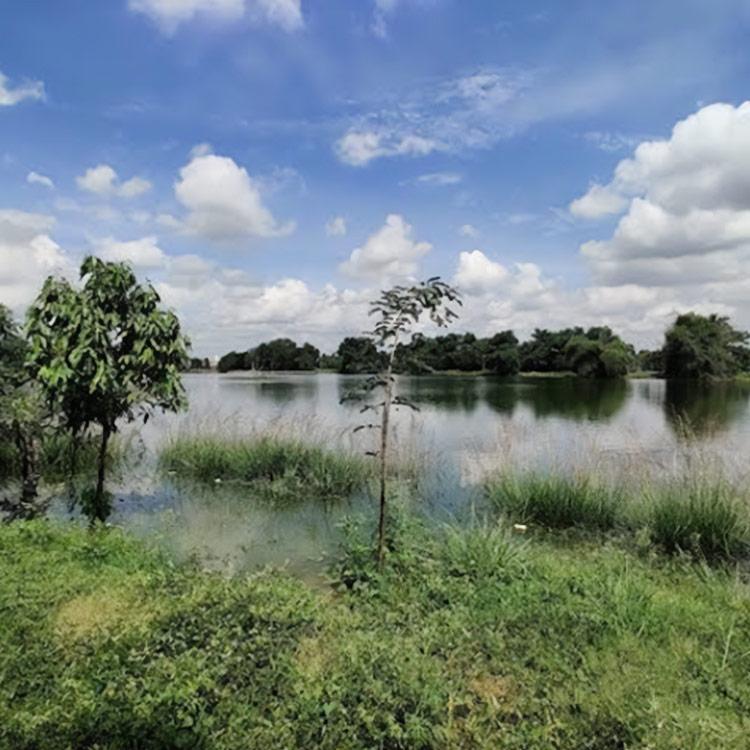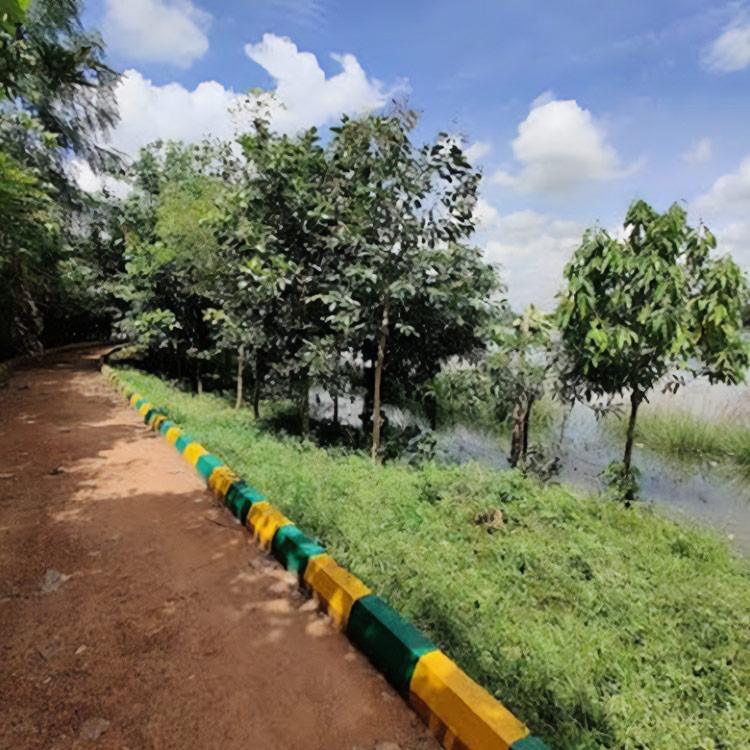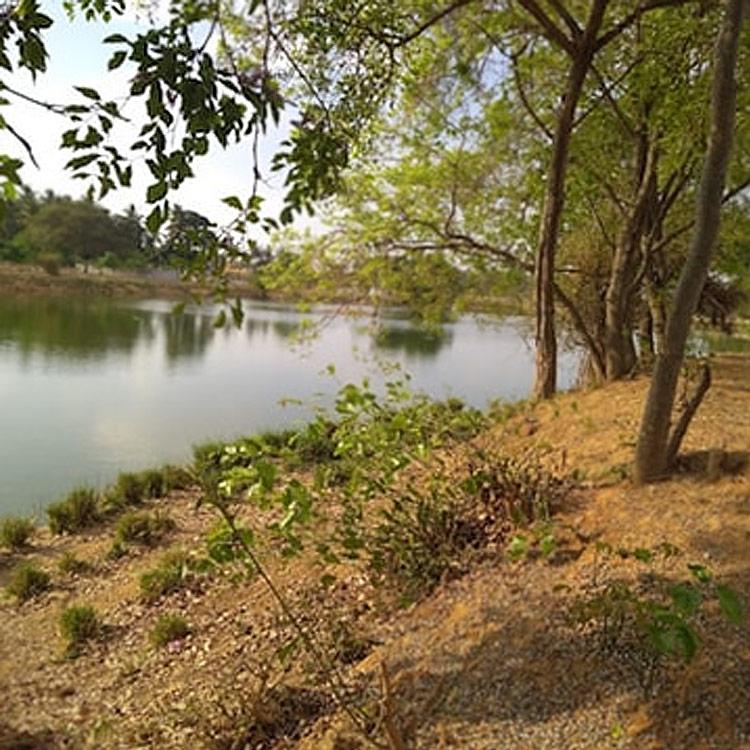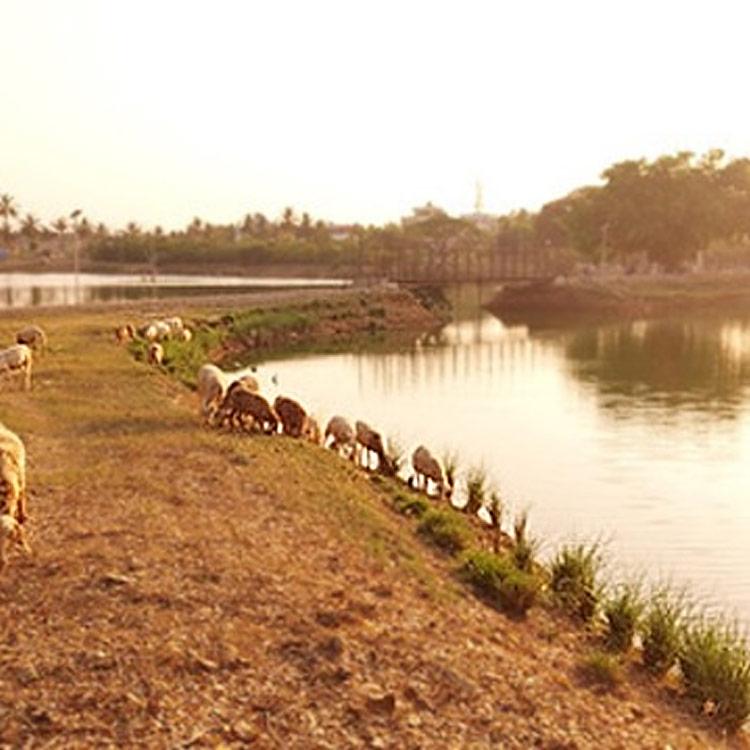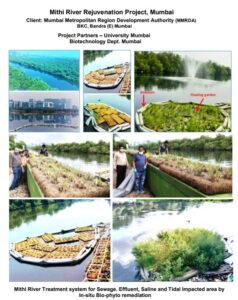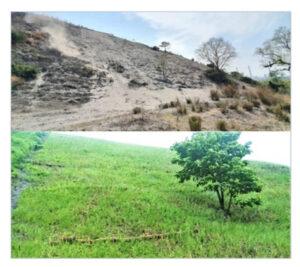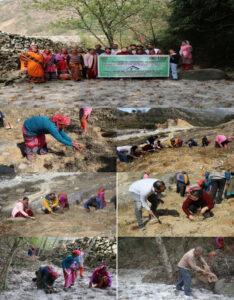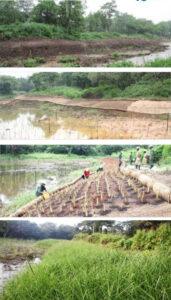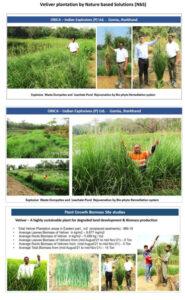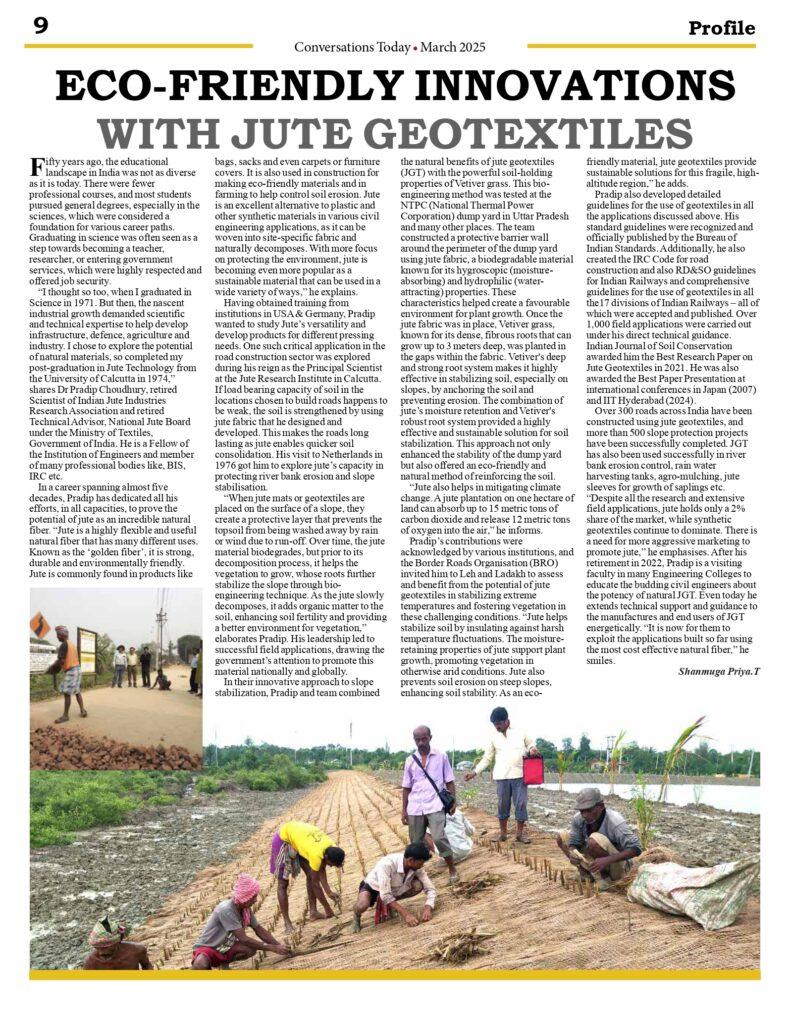Greetings from the India Vetiver Foundation
As we continue our journey towards ecological restoration and sustainable environmental practices, the edition of Vetiver Voice brings inspiring stories in India. From large-scale remediation projects to community-driven initiatives, Vetiver’s impact continues to grow.
This edition covers key updates, success stories, and upcoming initiatives that showcase vetiver’s incredible potential in various aspects.
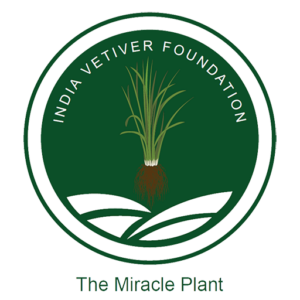
Vetiver as a Natural Farming Ally
Vetiver has long been recognized as an invaluable tool for farmers. Its dense root system not only prevents soil erosion but also acts as a natural filter, preventing chemical runoff and improving soil health. Farmers using vetiver report higher crop yields, reduced irrigation needs, and better pest resistance.
Points to Ponder:
- Vetiver is being increasingly adopted by organic farms to protect against contaminants from neighboring fields, preserving soil purity.
- Soil Moisture Retention: Research indicates vetiver’s ability to retain moisture in soil, reducing dependency on artificial irrigation methods.
Upcoming Events : Regional Vetiver Conference (RCV1)
Regional Vetiver Conference (RCV1) will be held in Raipur Chattisgarh. Jointly promoted by Chhattisgarhi tribal local health traditions and Medicinal plants Board and India Vetiver Foundation, and this prestigious event will be held on 4th – 6th June 2025, in Raipur, Chattisgarh State, India.
RCV1 will bring together all stakeholders, experts, researchers, practitioners etc., in India and from countries around India. Papers will be presented by many during a 2-day meet. Technical sessions followed by a field visit (optional) on the 3rd day. More updates will be posted in next few weeks.
One of the world's largest Vetiver Plantation in Chattisgarh state
Vetiver Plantation for Forest Conservation and Livelihood Enhancement in Chhattisgarh
Chhattisgarh Tribal Local Health Traditions and Medicinal Plants Board took the initiative in 2024 by the planting of Vetiver in Forests for the improvement of Forest Floor Health by conserving soil and moisture. Vetiver slips were planted along bunds and slopes of the forest streams for stabilization, and addressed the gentle and steep slopey areas to control the erosion of soil.
All together 4 Million slips were planted in Mungeli Forest Division over an area of 3000 Ha. and 1 Million slips, in Katghora Forest Division over 500 Ha. of area. This is consistently improving soil and moisture substantially and in every two-year intervals alternate bunches may be harvested for expansion and distillation of roots, for the benefit of forest dwellers.
Vetiver: I Am Fragrance of The Soil
All creatures are born of the earth, and nourished by her rich flavors. I am the fragrance of the soil, Lord Krishna proclaims in the Bhagavat Gita, reminding us of God’s life-giving presence within the most humble of elements.
Every plant absorbs the prana (life force) and ojas (nutritive essence) of the soil into its body, transforming them into foods, medicines, and oils for the benefit of other beings. Yet none captures the subtle complexities of the Earth’s mysterious fragrances as completely, as vetiver grass, known in India as khus.
Khus (Vetiveria zizanioides) is a grass that grows up to six feet high. Vetiver’s deeply penetrating roots and thousands of tiny fibrous rootlets reach out to drink in the aromatic molecules from the surrounding soil, which in turn become the multi-layered perfume notes of its dark amber oil.
Read more: https://www.floracopeia.com/vetiver-i-am-the-fragrance-of-the-soil
Credits: David Crowe

Ganesan Arunasala Voice of Farmer - Vetiver
Wild Eden organic farms
By Mr. Fmr Ganesan Arunasalam
Director- India Vetiver Foundation & Founder Director of Wild Eden organic farms.
We, the Natural/ Organic/ chemical farmers of The Nilgiris district (TOHFA) are from the Western ghats range of mountains, older than the Himalayas. We are about 35,000 Exotic vegetable growers and 45,000 small and medium Tea growers. Every year we are losing around 6 cm of top soil down the slopes of the hills because of the heavy seasonal monsoon rains.
In order to protect the rich organic content top soil, Wild Eden Organic farms has set up a nursery which cultivates and provides Vetiver tillers to the local farmers to use as a hedge crop to protect soil erosion. Till now, around 15,000 tillers have been deployed in many step cultivation farms throughout the district. With concrete plans of supplying Vetiver tillers across Nilgiris district, resulting in protecting top soil every year .
We encourage other farmers to grow Vetiver and get additional income too besides improving SOM (Soil Organic Matter) and water table during peak summers. Wild Eden and TOHFA are focussed on extensive adoption of the Vetiver.

A Natural Farmer's Perspective about Vetiver
The Wall Underground
By Mr. Pradeep Kumar,
Director- Rangamalai Organic Farms
In natural farming, where sustainability and soil health are essential, Vetiver stands as a powerful ally. While widely recognized for preventing soil erosion, its deep and dense root system plays an even more crucial role—as an underground barrier, shielding farms from external pollutants and preserving the purity of naturally cultivated land.
When planted along the borders of a natural farm, Vetiver roots form a dense underground network that absorbs and filters seepage water from neighboring fields—especially those using chemical fertilizers and pesticides. This natural filtration prevents harmful substances from contaminating the soil, keeping your farm’s ecosystem pure and chemical-free.
Vetiver’s deep roots can grow deep, reinforcing land stability while creating a long-lasting protective shield. Unlike artificial barriers, Vetiver continually strengthens over time, offering a self-sustaining defense system for your farm.
How Vetiver Acts as an Underground Shield?
During rainy seasons, water often carries contaminants from surrounding fields through:
- Surface runoff – Rainwater flowing across chemically treated fields.
- Rodent burrows & soil gaps – Water movement through underground tunnels and fissures.
- Capillary action – Slow underground water seepage between fields.
- Irrigation overflow – Excess water infiltrating from chemically managed lands.
Planted along farm boundaries, Vetiver’s thick, fibrous roots form a natural filter, absorbing excess water and breaking down pollutants. The result? A protected zone, preserving soil fertility, biodiversity, and the integrity of natural farming practices. This system also prevents nutrient depletion, ensuring healthier crops and improved yields over time.
Additional Benefits of Vetiver in Farming
Beyond serving as a pollution barrier, Vetiver offers multiple benefits:
- Prevents soil erosion, stabilizing land and retaining topsoil
- Enhances soil moisture retention, reducing irrigation needs
- Boosts microbial activity, enriching soil health
- Acts as a windbreak, protecting delicate crops
- Repels pests naturally, reducing dependence on pesticides
- Can be used as fodder, benefiting livestock farmers
Us & Vetiver
At Rangamalai Organic Farms, we believe that farming is one of the most beautiful and profitable businesses on earth. Beyond producing food, agriculture connects us to nature, fosters sustainability, and ensures the well-being of future generations. We are committed to implementing and sharing natural farming techniques that promote environmental balance and long-term soil health.
A Farmer’s Experience: Mr. Venkateswaran K.N. Vetiver Journey
Organic Farmer
Mr. Venkateswaran K.N.
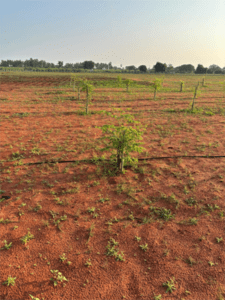 Mr. Venkateswaran K.N., an organic farmer in Sattangulam, Tirunelveli District, Tamil Nadu, has been cultivating Moringa leaves and pods across 12 acres of land while exploring Vetiver’s benefits. Encouraged by discussions with India Vetiver Foundation, he acquired 10,000 tillers from Marg Swarnabhoomi and developed a Vetiver nursery a few months ago.
Mr. Venkateswaran K.N., an organic farmer in Sattangulam, Tirunelveli District, Tamil Nadu, has been cultivating Moringa leaves and pods across 12 acres of land while exploring Vetiver’s benefits. Encouraged by discussions with India Vetiver Foundation, he acquired 10,000 tillers from Marg Swarnabhoomi and developed a Vetiver nursery a few months ago.
Why Vetiver?
- Soil Organic Matter (SOM) Improvement: Vetiver enhances soil fertility
- Mulching Benefits: Shoots provide a natural mulch to protect soil
- Water Table Improvement: Reduces evaporation and increases groundwater retention
- Prevention of Topsoil Runoff: Stabilizes soil structure and prevents erosion
A Model for Future Adoption
With his 12-acre Moringa plantation, including value-addition plans, Mr. Venkateswaran’s farm could become a regional showcase for Vetiver-based farming. Neighboring farmers may soon adopt Vetiver practices, promoting sustainable agriculture in the region.
In Venkatesh's Words:
“I was new to farming and was discussing my plans for Moringa cultivation with P.N. Subramanian (PNS) from India Vetiver Foundation (IVF). During a casual conversation, PNS impressed upon me the qualities of Vetiver, helped source the tillers from Marg Swarnabhoomi, and has been actively guiding me while connecting me with the right people.”
Vetiver - Nature's Gift For The Environment
Reviving Water Bodies: A Success Story from Pollachi and Yelahanka Lake
Vetiver has been successfully implemented to protect ponds and lakes, with projects in Kanna Mangala Lake (Bangalore) and a pond near Pollachi receiving positive feedback on water quality improvement.
Photos Courtesy: Mr. Vincent
Similarly, at Yelahanka Lake, next to the railway wheel factory, vetiver, seedballs, and saplings were used to rejuvenate the ecosystem. Over time, the lake thrived and became a bird-friendly habitat. Initially managed by the Forest Department, the lake may now be under Bruhat bengaluru mahanagara palike (BBMP). The initiative saw active participation from IRS (Indian Revenue Services) officers, showcasing the power of collective action in environmental conservation.
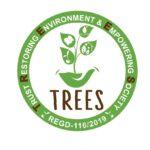
Vetiver Plantation by "TREES"
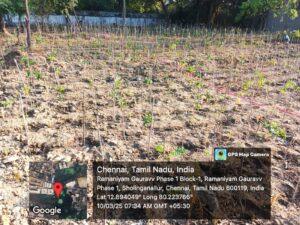 TREES has planted more than 1 million trees in various protected areas. The plants are watered well, and TREES provides support for 3 years, after which the trees grow on their own.
TREES has planted more than 1 million trees in various protected areas. The plants are watered well, and TREES provides support for 3 years, after which the trees grow on their own.
India Vetiver Foundation (IVF) has been encouraging them to plant Vetiver alongside tree saplings. The benefits of Vetiver will positively impact the trees planted. They planted 3,500 Vetiver tillers in a tree planting initiative at a milk dairy plant a few weeks ago.
This will be followed by utilizing Vetiver for other applications. Interplanting Vetiver in tree planting initiatives should yield positive outcomes in the near future.
Environmental Protection
Vetiver is proving to be a game-changer in urban and rural environmental conservation. It is being used for wetland restoration, riverbank stabilization, and pollution control across India and beyond.
Key Projects:
Akkulam Lake Rejuvenation (Kerala)
Covering 225 acres, this project focuses on water purification using bioengineering techniques, including floating islands, solar aeration systems, and microbial applications to improve water quality. The initiative also includes biodiversity restoration and eco-tourism development (Source: Mr Pradeep Kumar, (Veteran of Vetiver Industry) BIOSTARTS Ventures Profile.pdf).
Bantala Leather Complex Project (West Bengal)
This 40-acre industrial water remediation project aims to remove harmful contaminants from tannery wastewater through in-situ bioremediation and phytoremediation techniques
(Source: Mr Pradeep Kumar, (Veteran of Vetiver Industry) BIOSTARTS Ventures Profile.pdf).
Sundarbans Rejuvenation Efforts
Ongoing studies focus on coastal erosion prevention using vetiver bioengineering to stabilize vulnerable shorelines (Source: Mr Pradeep Kumar, (Veteran of Vetiver Industry) BIOSTARTS Ventures Profile.pdf).
Mithi River Rejuvenation (Mumbai)
Our collaboration in southern India, particularly in Hampi, focuses on using vetiver to safeguard river flows and prevent soil erosion. This UNESCO heritage site stands to benefit immensely, as vetiver not only stabilizes riverbanks but also multiplies rapidly—anywhere between ten to forty times. With this natural expansion, we hope that within five years, vetiver will provide comprehensive protection along both sides of the river flowing through this historic landscape.
ExNoRa
ExNoRa, a well-known environmental organization, has been actively promoting Vetiver plantation in Eco Parks, urban forests, and along water bodies to enhance ecological sustainability. Recognizing Vetiver’s anti-bacterial, soil-stabilizing, and water-purifying properties, ExNoRa has undertaken multiple initiatives, including:
- Planting Vetiver in Perungudi Eco Park, Keelkattalai Eco Park, and Thirumulaivoyil Forest
- Water body restoration efforts like the Hiranandani Community Campus Pond cleanup in Navalur
- Puducherry keni Water Body Cleanup, involving community participation
Veteran Mr. P. N. Subramaniyan (PNS) has been instrumental in promoting Vetiver cultivation across India, leading an association dedicated to expanding Vetiver’s use for environmental restoration.
For more details, refer to the full article in ExNoRa’s newsletter: (feb 1402 pdf)
Photos Courtesy: Mr. Vincent
Slope Retention & Bioengineering
One of vetiver’s most remarkable applications is in slope stabilization and bioengineering. Due to its deep-root system, vetiver holds soil firmly, preventing landslides and controlling erosion.
Recent Projects:
Fly Ash Dumpsite Stabilization (Bokaro, Jharkhand)
Bhiri-Banswara Demonstration Drive
Highway & Railway Embankment Stabilization
Increasing use of vetiver in infrastructure projects to prevent soil degradation.
Phytoremediation - Cleaning Contaminated Lands
Vetiver’s remarkable ability to absorb and break down pollutants makes it a powerful solution for environmental cleanups.
Key Research & Applications:
ORICA Land & Water Remediation Project (Jharkhand)
Heavy Metal Absorption
Studies show that vetiver removes lead, cadmium, and arsenic from polluted soil.
Vetiver in Medicine & Aromatherapy
Vetiver has long been valued for its therapeutic and medicinal properties. It is essential oil is known for its calming effects, helping relieve stress, anxiety, and insomnia. It is also used to treat inflammation, skin ailments, and digestive issues. Vetiver Infused Water is Popular in summer months for its cooling and detoxifying properties.
Spotlight: Dr. Gowthaman Krishnamoorthy
A Visionary in Ayurveda & Holistic Wellness
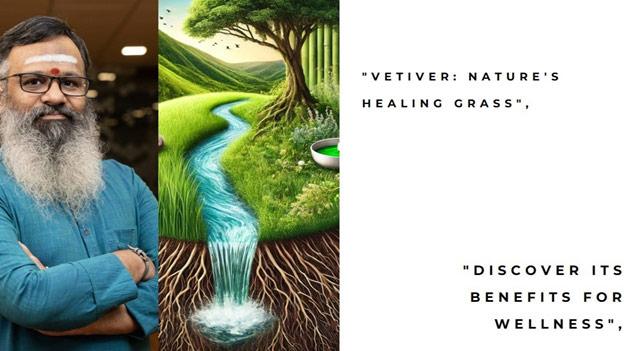
Bridging Ancient Wisdom with Modern Healthcare
Dr. Gowthaman Krishnamoorthy, widely known as Wellness Guruji, is a pioneering expert in Ayurvedic medicine, clinical nutrition, and holistic wellness. With over nine years of leadership at Shree Varma Ayurveda Hospitals, he has played a crucial role in revitalizing traditional healthcare, expanding Ayurvedic product innovation, and driving digital transformation in the wellness sector.
Dr. Gowthaman is highly regarded for his patient-centric approach, making Ayurveda simple and effective for everyday life. His dedication to integrating ancient wisdom with modern healthcare solutions continues to inspire individuals and institutions worldwide.
Vetiver: The Grass That Heals the Earth & Nurtures Wellness
A Timeless Wonder Rooted in Tradition & Science
Vetiver (Vetiveria zizanioides), known as Khus, is not just a plant—it is a natural solution for sustainability, wellness, and environmental restoration. With its deep-rooted history in Ayurveda, agriculture, and ecological conservation, Vetiver continues to prove its value in various industries.
Vetiver: A Global Heritage
- Ancient Significance: Used for centuries in Ayurveda, Siddha, and Unani medicine, Vetiver has played a key role in natural healing, cooling therapies, and fragrance production.
- Modern Applications: Today, Vetiver is widely embraced in perfumery, skincare, agriculture, and environmental protection across the Globe.
Medicinal Marvel: Healing from Within
Vetiver is celebrated for its detoxifying, cooling, and restorative properties, making it a staple in traditional medicine and holistic wellness.
- Ayurveda & Siddha: Helps balance Pitta and Kapha doshas, soothes skin ailments, and enhances digestion.
- Unani Medicine: Recognized for its calming, heart-strengthening, and anti-inflammatory effects.
- Modern Science: Research validates Vetiver’s antioxidant, antimicrobial, and neuroprotective benefits.
Vetiver in Daily Wellness
- Vetiver Infused Water – A natural summer coolant that aids digestion.
- Aromatherapy & Essential Oil – Relieves anxiety, improves sleep, and enhances mental clarity.
- Skincare & Haircare – Treats acne, soothes inflammation, and promotes hair health.
Vetiver: A Champion for the Environment
Vetiver’s deep-root system makes it an ecological powerhouse for:
Erosion Control: Strengthening soil structure to prevent landslides.
Water Purification: Absorbing toxins and improving groundwater quality.
Sustainable Agriculture: Naturally repelling pests, enriching soil, and increasing crop yields.
Success Stories Around the World
- India: Used extensively for riverbank stabilization and large-scale afforestation.
- Africa: Plays a vital role in desertification control and livestock fodder.
- Southeast Asia: Supports organic farming and permaculture initiatives.
Credit: Inspired by “Vetiver: The Grass That Heals the Earth” – LinkedIn Article by Krishnamoorthy JMT6C
https://www.linkedin.com/pulse/vetiver-grass-heals-earth-nurtures-wellness-krishnamoorthy-jmt6c/”
Join the Movement! If you have a Vetiver-related initiative or success story, we’d love to feature it in our next issue.
Together, let’s grow a greener future with Vetiver!
A Breakthrough in Diabetes Treatment
Dr Sangita Saini's Vetiver-Based Anti-Diabetic Research
Dr Sangita Saini M. pharm., Ph.D, a pharmaceutical researcher with over 19 years of experience, is currently a Professor at Bhagwan Mahavir Institute of Medical Sciences, Sonepat. She holds a Ph.D. in Pharmaceutics from Guru Jambheshwar University and has worked extensively on integrating traditional and modern healthcare systems. With more than 25 research papers, six books, and five patents, her work in herbal formulations has gained recognition globally.
Her latest research focuses on a vetiver-based anti-diabetic medicine, which is undergoing clinical trials. The formula, a patented polyherbal blend, aims to manage diabetes naturally by enhancing insulin sensitivity, reducing inflammation, and supporting beta-cell regeneration.
Key Benefits of the Vetiver-Based Medicine:
- Antioxidant Properties: Vetiver oil removes free radicals, protecting against diabetic neuropathy.
- Neuropathy Management: Improves blood circulation and oxygen supply to the brain, benefiting nerve health.
- Kidney Protection: Shows promise in reducing diabetic nephropathy risks.
- Natural Action on Beta Cells: Unlike conventional treatments, it supports long-term diabetes management with minimal side effects.
The research highlights 12 rare herbs, including Curcuma longa (turmeric), Phyllanthus emblica (amla), and Vetiveria zizanoides (vetiver), all known for their potent anti-diabetic and anti-inflammatory effects.
With a patented formulation and promising clinical trials, commercialization may begin within six months. If successful, this could offer a safer, herbal alternative for diabetes management.
Vetiver Roots and Oil
- Vetiver’s deep root system is valuable for soil stabilization and erosion control.
- The oil extracted from vetiver roots is used in luxury perfumes, skincare, and herbal medicines.
Carbon Sequestration and Carbon Credits
- Vetiver plantations have been recognized for their ability to store large amounts of atmospheric carbon.
- Discussions are ongoing to integrate vetiver projects into carbon credit trading programs, providing financial incentives for large-scale plantations.
Vetiver in Handicrafts - Market Adoption
Vetiver leaves and roots are being used in handicrafts, providing sustainable economic opportunities.
Vetiver Handicrafts Training – Kerala
- Kerala Training Program: A three-day Vetiver Basket Making Workshop session in Kuttikkanam, Idukki District saw 12+ participants learning to craft high-quality, eco-friendly products.
- New initiatives are supporting women-led businesses in handmade vetiver-based products. Participants received 200 vetiver tillers each to help establish their own supply chains.
- Eco-Friendly Construction: Vetiver leaves are being explored as a natural roofing material, offering insulation and durability.
- Many individuals started Tillers planting after supplies.
Read More: https://www.facebook.com/groups/vetivernetwork/?ref=share&mibextid=KtfwRi
Photo Credits: PDS Kerala Training Team
Building Materials & Roofing Grass
Vetiver reduces moisture damage. When planted along fences, vetiver can be managed at any height and serves as a natural screen, a “rain garden,” and a habitat for birds and insects. Its versatility makes it a valuable addition to residential landscapes worldwide.
Vetiver roofing was executed in EPIC, a project of Smt. Santha Sheela Nair, IAS, Retd. She supports Vetiver in a big way especially with regards to bringing in Government interventions. About 22 ft by 35 ft will be the place where all invitees meet and discuss. The roof was replaced with Vetiver Grass.
Vetiver - Jute Geotextiles
By Dr. Pradeep Choudhary retired from Jute board West Bengal.
Awards and Recognition for Vetiver
Vetiver was the centre of attraction in Manava Seva Dharma Samvardhini Awards conducted in March in Tindivanam about 125 kms from Chennai.
Two of our Vetiver Entrepreneurs were awarded for their successful Vetiver Entrepreneurship.
They are Mr. Kamalanathan from Pondicherry. A veteran in Vetiver cultivation in 20 acres and distills oil in his captive steam distillation unit.
And Avaral Pathak from Kannauj, Uttar Pradesh … A young budding Entrepreuner who uses Native Vetiver (Khus) and distills using the Deg & Butka method which has a history of few centuries and also edible oil. Very labor intensive process with less yield and fetches a very good price.
Vetiver Distribution
Vetiver was distributed in bunches of 5 to more than 200 farmers who have participated in MSDS Awards.
Many big farmers and groups of farmers were very keen on growing.
India Vetiver Foundation have planned subsequent meetings and training in April and May 2025.
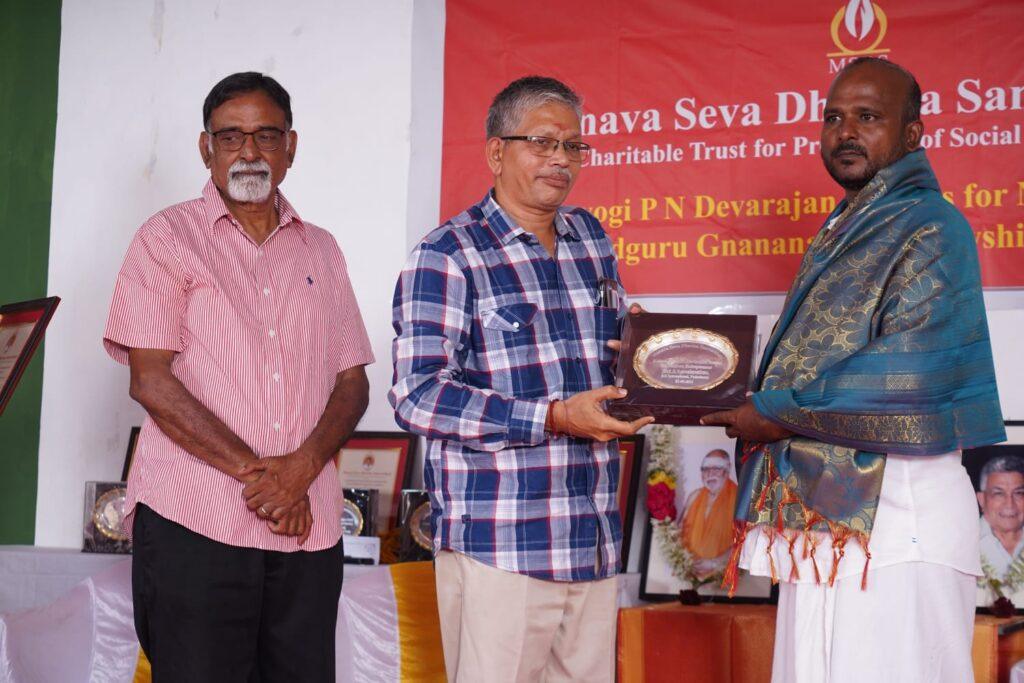
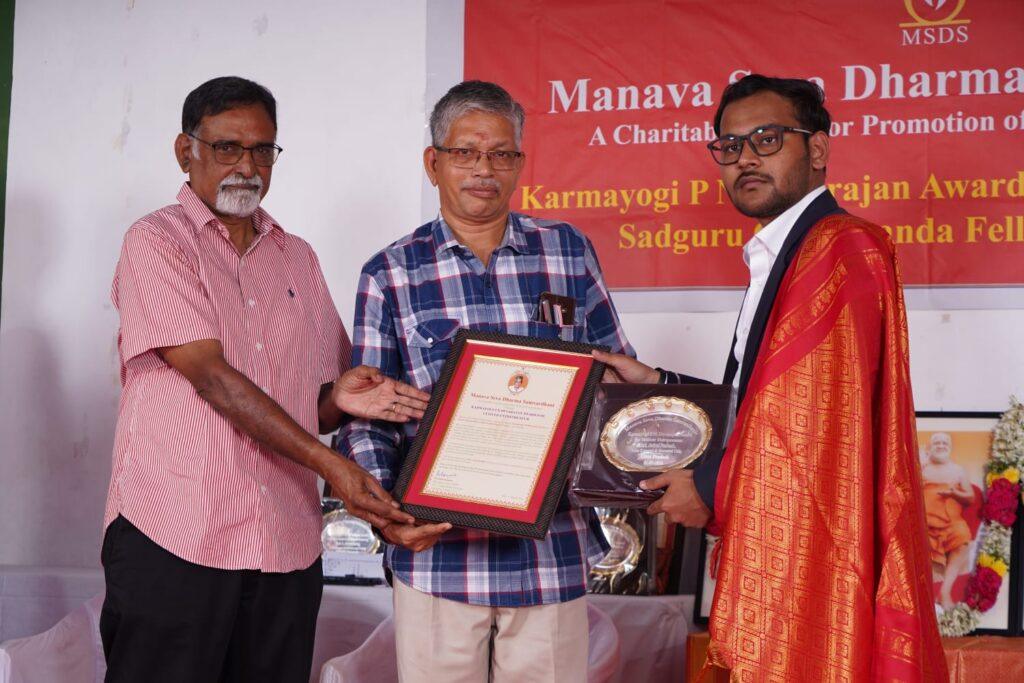
DD Tamil interview of Mr. Rameswaram Sriram

Full Video of Mr Rameswaram Sriram’s interview on DD Tamil
Events
Workshop: Water Action, Vigilance and Empowerment through Science (WAVES): 27th March 2025
Organised by Prof. Indumathi Nambi, IIT Madras
This event will explore the environmental and economic benefits of Vetiver.
Key Highlights:
- Strengthening Lake Bunds with Vetiver – Insights by Exnora Mohan and P.N. Subramaniyan on using Vetiver for erosion control.
- Vetiver for Livelihood Creation – Ms. Poorni, a trained expert in Vetiver handicrafts and a resource person with the Chingleput Collectorate, will discuss the economic potential of Vetiver roots and grass. She will also exhibit her handcrafted Vetiver products at the event.
This initiative aims to promote sustainable practices and livelihood opportunities through Vetiver.
Journey to Sustainable Vetiver Farming and Processing by FICCI and CIMAP
The event is organised by FICCI on April 2, 2025, in Puducherry and Cuddalore. This event will bring together farmers, scientists, and industry experts for discussions on vetiver farming, value addition, and sustainable processing technologies.

An article in The Hindu highlighted Vetiver (Chrysopogon zizanioides) for its deep-rooted system that prevents soil erosion and supports climate resilience. Cultivated in Tamil Nadu, it benefits both the environment and local livelihoods through handicrafts and essential oil production.
Vetiver continues to revolutionize agriculture, environmental conservation, industry, and wellness. With ongoing research and large-scale adoption, the possibilities for this miracle grass are endless.
Thank you to all contributors and members working towards sustainable vetiver applications. If you have a vetiver-related success story, we’d love to feature it in the next issue!
Stay connected, stay green!
India Vetiver Foundation
For contributions, research updates, and queries, contact us at subramanian@gmail.com
Follow us on Facebook, LinkedIn, and Twitter for real-time updates on Vetiver projects worldwide.

